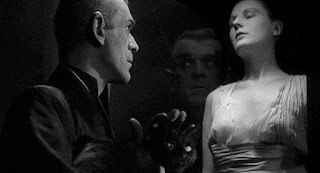by A.J.
Night 11: Universal Horror Night
“Superstitious, perhaps. Bologna, perhaps not.”
Released in 1934, The Black Cat is unusual for a Universal Studios horror picture because it features none of their signature monsters like Dracula, Frankenstein’s Monster, the Mummy, or any monsters, at least no supernatural ones. However, The Black Cat does feature the biggest horror stars of the era, Bela Lugosi and Boris Karloff giving some of the best performances of their careers. The title card says the movie is “suggested by the immortal Edgar Allan Poe classic” but that claim is more than a stretch as the only thing the plot has in common with the Poe short story is the inclusion of a black cat in one scene. Fortunately, the story invented by screenwriter Peter Ruric and co-writer and director Edgar G. Ulmer makes for a superbly dark and creepy old-school horror picture.
While traveling on the Orient Express through Hungary on their honeymoon, newlyweds Peter (David Manners) and Joan (Julie Bishop) end up sharing a train compartment with Dr. Vitas Werdegast (Bela Lugosi), who is very polite but mysterious. They also share a carriage but after an accident Dr. Vitas takes them to the closest shelter, which happens to be his destination: the home of an “old friend,” Hjalmar Poelzig (Boris Karloff). We learn that Vitas and Poelzig are actually deadly enemies. During the Great War Poelzig betrayed their army, leading to a massacre and Vitas being sent to a prison camp where he says, “the soul is killed slowly.” Poelzig built an elaborate estate on the site of the massacre, kidnapped Vitas’s wife, whose body he keeps preserved in a glass case, and is now married to Vitas’s daughter. Poelzig is also a Satan worshiper and wants to use Joan in a ritual. In short, he is a very bad guy. It is no wonder why Vitas is so set on revenge. Vitas has also been driven mad from his time in the prison camp and is so set on getting vengeance that even learning that his daughter is still alive doesn’t alter his revenge mission.
The highlight of The Black Cat is watching Lugosi and Karloff duel, first with their words and later with their fists. Vitas and Poelzig have a strange respect for each other even though their hatred for each other permeates every scene. Karloff is excellent as the sinister and evil Poelzig. We first see him in silhouette and his tall, gaunt, and slender figure is used to great effect. Karloff’s lilting voice also adds an extra creepy layer to his dialogue. Lugosi gets to be the hero, sort of—anti-hero might be a better description. He has been so overwhelmingly wronged by Poelzig that he has your sympathies even though his plan is to horribly torture Poelzig. His main redeeming quality is that he wants no harm to come to Peter or Joan and goes out of his way to protect Joan (Peter proves to be superfluous, even misunderstanding Vitas’s rescuing Joan). As Vitas, Lugosi brilliantly delivers many wonderful and eerie speeches that do as much to create a chilling atmosphere as the setting and score.
Poelzig’s home is not a creepy gothic castle but a surprisingly modern looking estate. Peter describes it as a “nice, cozy, unpretentious insane asylum.” The lair where Vitas’s wife’s preserved body is kept and the satanic ritual is performed is a mix of dungeon and mad scientist’s lab. Vitas’s torture of Poelzig happens offscreen but still makes you squirm. The Black Cat was made before the puritanical Production Code heavily restricted the content and subject matter of all movies. With its plot dealing with violent revenge, torture, satanism, implied rape, and necrophilia, there’s little chance it could have been made after the code became strictly enforced. Because of this, The Black Cat still retains some surprising shock value even after nearly 90 years. This movie is not nearly as well known or widely seen Dracula (1931) or Frankenstein (1931), but it is as deserving of classic status, and in many ways it is the scarier classic horror movie.
The Black Cat airs on TCM on Halloween at 1:30 PM CT and is currently streaming on the Criterion Channel. 




No comments:
Post a Comment